- Home
- Sustainability
- Empowering diverse human resources to shine
- Human Rights and Labor-Management Relations
Human Rights and Labor-Management Relations
Basic Approach
Since its inception, the JFR Group has conducted business activities that earn the trust of stakeholders based on the corporate credos “Service before profit” and “Abjure all evil and practice all good.” In recent years, there has been increasing concern about human rights issues in Japan and abroad, such as forced labor and discrimination in supply chains. Companies are expected to conduct business activities that respect human rights. In accordance with the Guiding Principles on Business and Human Rights established by the United Nations, respect for human rights underlies all the business activities of the JFR Group. Through our commitment to respect for human rights, we will realize business activities that respect the human rights of our customers, business partners, and employees, and contribute to the realization of a Well-Being Life for all our stakeholders.
Human rights policy
The Group includes a human rights policy in the JFR Principles of Action and the JFR Principles of Action for Suppliers, both of which were formulated in 2019.The human rights policy was formulated based on the International Bill of Human Rights, the Guiding Principles on Business and Human Rights, the ILO Declaration on Fundamental Principles and Rights at Work, and the Ten Principles of the United Nations Global Compact. This policy provides our ideas for deepening understanding of various human rights issues that form the foundation of all our business activities and for taking appropriate actions.
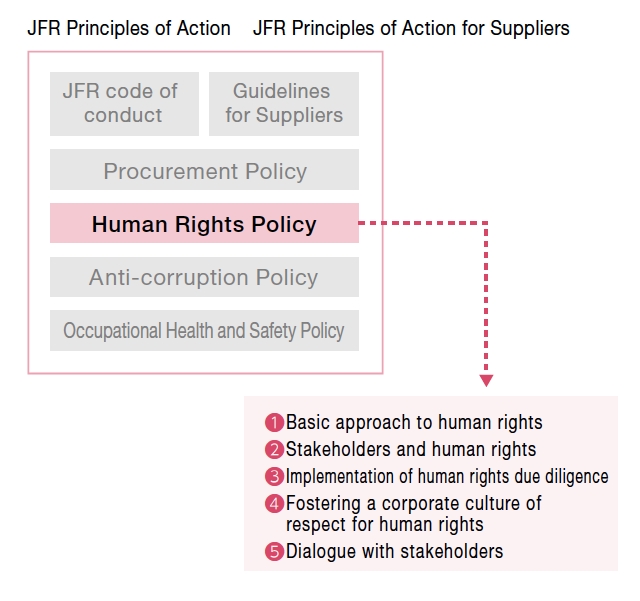
System
The Group's specific policies on sustainability initiatives, including responses to environmental and social issues, are discussed and approved by the Group Management Meeting, the highest decision-making body for business execution. Matters approved by the Group Management Meetings are shared with all operating companies via the Sustainability Committee, which serves as an advisory body to the President and Representative Executive Officer. In addition, the Sustainability Committee monitors the implementation plans and progress of each operating company to enhance the effectiveness of Group-wide initiatives. In response, the Board of Directors discusses and supervises target setting, policies, and action plans based on reports about matters approved by the Group Management Meeting and the activities of the Sustainability Committee.
Human rights due diligence
The Group identifies and assesses human rights risks in its corporate activities and conducts human rights due diligence to prevent and mitigate such risks. Through these efforts, we aim to realize business activities that respect human rights together with our business partners.
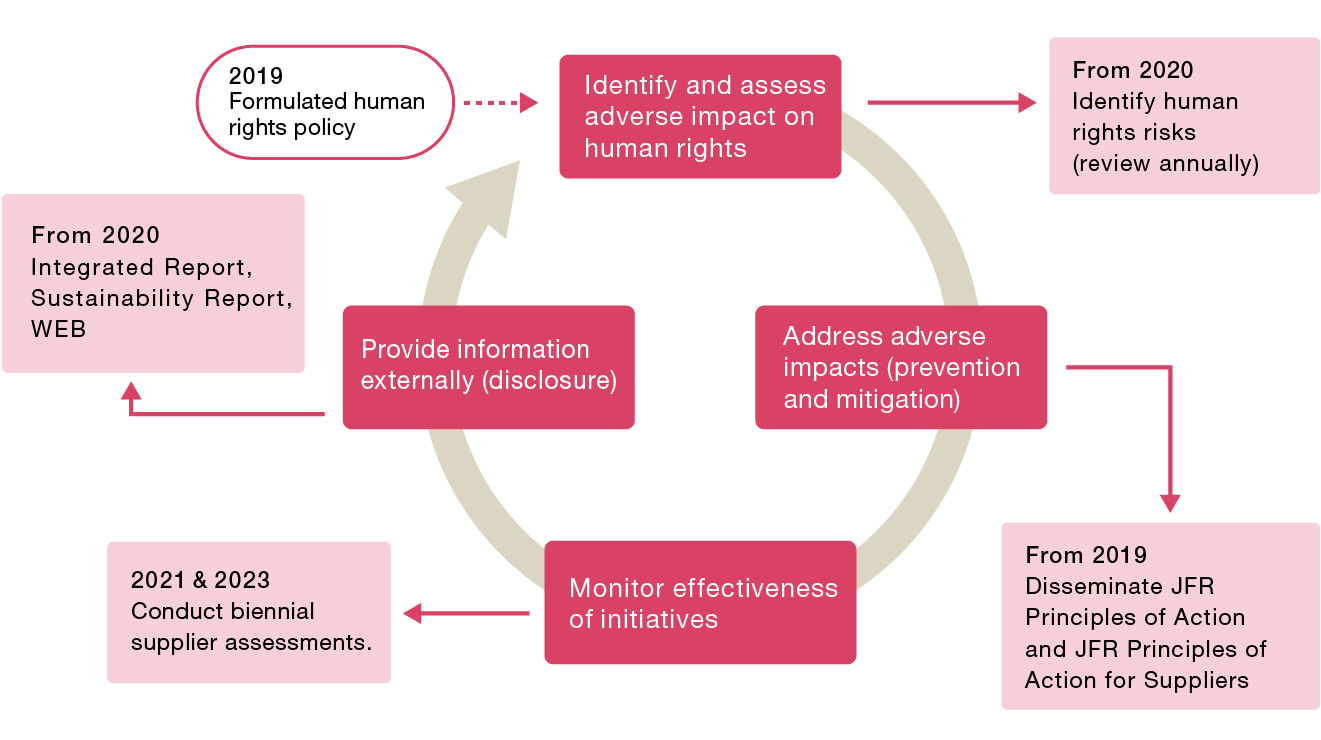
"Management of the entire supply chain"
Identification and assessment of human rights risks
The Group has identified and assessed the human rights risks (potential negative impact on human rights) of stakeholders who could be affected in relation to the Group's business activities. Through this process we were able to identify and assess more substantive human rights risks through the participation and reviews by external experts, including the divisions in charge of the operating companies and lawyers.
Organizing the entire business value chain and exhaustively identifying the human rights issues that can be anticipated for each business line
Evaluate the identified human rights issues in terms of depth (scale, scope, and difficulty of remedy) and likelihood of occurrence, and identify human rights risks that are of high importance to the Group
Significant human rights risks
|
Value chain |
Upstream |
(JFR Group business activities) |
Downstream |
|---|---|---|---|
|
Stakeholder |
Employees of supplier companies, store operators, cooperating companies of business partners |
Employees of the JFR Group (including parttime workers in stores and temporary workers dispatched by suppliers) |
Customers and local residents |
|
Details |
Manufacturing, wholesales, provision of services, construction |
Commercial facilities, store operations (including remodeling, advertising, facility management, sales promotion, etc.), sales (including e-commerce), planning and construction |
Use of goods and services |
|
Significant human rights risks related to the Group’s business |
Forced labor |
・ Harassment ・Long working hours ・Discrimination (gender, LGBTQ, etc.) |
・Violation of customer
privacy (personal
information and right of
publicity) |
Prevention and remedy of human rights risks
In order to prevent and remedy human rights risks, the Group is taking measures such as providing our employees with training on the Principles of Action and human rights education. For suppliers, we disseminate the Principles of Action for Suppliers and engage in dialogue continuously for improvement. For consumers (customers), we have customer consultation desks and a Consumer Product End-Use Research Institute, which conducts tests and provides consulting services concerning product quality. We will also strive to provide accurate and easy-to-understand information.
Education on human rights
In 2020, the Group adopted a Declaration on the Elimination of Harassment and is striving to eliminate and prevent harassment, which it considers as one of the human rights risks. We conduct an annual harassment survey of employees, including part-time and temporary employees, and implement human rights training for managers based on the results of the survey. In 2023, we also carried out an e-learning course on business and human rights for all Group employees (participation rate: 88.7%). We will continue to provide education every year so that every employee can deepen their knowledge of respect for human rights and make it a personal issue in their lives.
Implementation of human rights assessment
Since 2021, the Group has been conducting supplier assessments to check the status of their efforts concerning matters that must be addressed throughout the supply chain. (In principle, assessments are conducted every other year.) The second assessment in 2023 was conducted with an emphasis on respect for human rights.
(Summary)
Implementing company:
10 operating companies including Daimaru Matsuzakaya Department Store, PARCO, J. Front City Development
Target:
Primary suppliers (1st tier) 3,281
*Narrowed down from multiple perspectives such as human rights risk, sales size, etc..
Period:
10/2023 to 12/2023
Questions:
Five themes*, mainly questions related to human rights. Total of 27 questions.
*Respect for human rights, human rights issues in the value chain, challenges in addressing human rights issues, and the penetration status of JFR Principles of Action for Suppliers.
Assessment criteria:
Scores, allocated for each question, are graded on a 4-point scale from A to D, according to the percentage of points received.
A/B:The company is making efforts in line with the Guiding Principles on Business and Human Rights
C:Some degree of commitment has been made
D:Candidate for dialogue
(Assessment Results)
Responses were received from 1,652 companies, for a response rate of 50.4% (+9.8 percentage points from the previous survey). Of the total, 31.7% of the companies were rated A or B, 55.8% (the largest share) were rated C, and 12.5% (206 companies) were rated D, making them a candidate for dialogue.
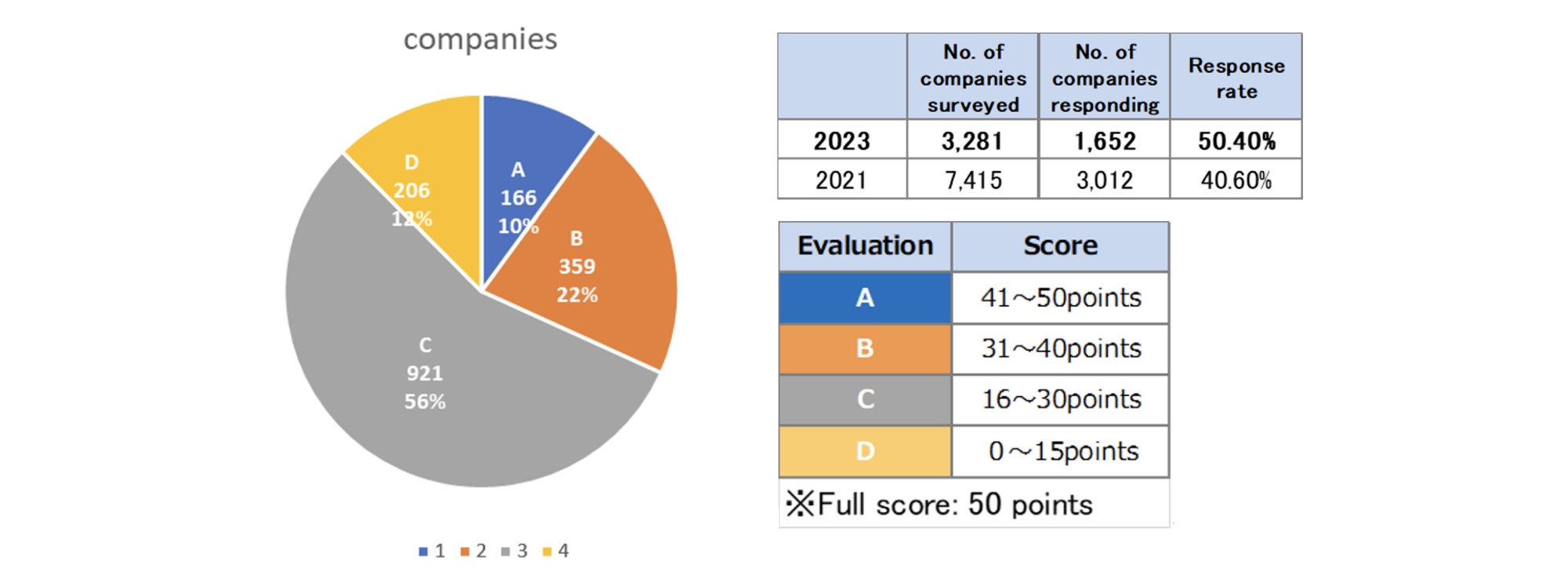
Penetration status of JFR Principles of Action for Suppliers
Of the respondents, 78% answered “Yes” to the question “Do you understand and comply with the JFR Principles of Action for Suppliers (including Human Rights Policy) in your daily business activities?” (60.9% in the previous survey).
Identification of human rights issues likely to arise among our employees and business partners
About 95% of the companies said they are aware of the human rights issues that are likely to affect their own employees, and about 87% are aware of the human rights issues that are likely to affect the employees of their suppliers.
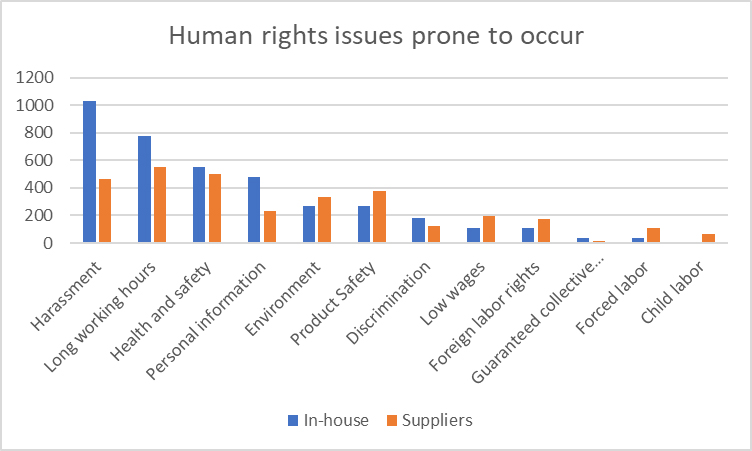
(Future responses)
In the assessment results, many companies cited insufficient knowledge as a reason for the lack of progress in their business and human rights initiatives, such as “don’t know what to do regarding human rights” and “don’t understand the basic framework of business and human rights.”
Accordingly, we intend to hold expert-led seminars and provide reference information to our suppliers. In addition, we will also provide opportunities for dialogue as necessary to share the assessments results, to gain an understanding of the importance of business and human rights initiatives, and to understand the situation of our suppliers and encourage them to make improvements.
Major initiatives for FY2024
(i) Implementation of dialogue with business partners
Based on the assessment results for FY2023, we held dialogues* with a total of 112 companies across the Group and shared our understanding of the importance of business and human rights initiatives in our business activities.
*Dialogues: Includes direct discussions as well as email exchanges.
(ii) Implementation of web seminars for suppliers
In the FY2023 assessment, many respondents expressed that they did not understand the basic framework for business and human rights. They requested support in the form of information and guidance on specific actions to take. In response, we held our first web seminar with external experts in January 2025 to enhance understanding of the importance of respecting human rights and to provide fundamental knowledge (63 companies participated).
(iii) Conducting third-party reviews
We conduct human rights due diligence. In 2024, we received an objective review from external experts on the scope, questions, and follow-up actions of our 2023 assessment. The results of this review were disclosed in our Sustainability Report.
JFR Sustainability Report 2024
(iv) Basic Policy on Customer Harassment
Daimaru Matsuzakaya Department Stores established a Customer Harassment Response Policy in December 2024. Previously, we used the Customer Harassment Response Guide, created in 2022, to conduct several training sessions at each store. These sessions aimed to create a system that protects employees (including part-time staff at stores and personnel dispatched by business partners) from customer harassment. We also focused on ensuring that specific response measures are clearly understood.
*Full text of the Customer Harassment Response Policy
Harassment Consultation Desk and Whistleblowing System
In 2020, the Group adopted a Declaration on the Elimination of Harassment to eliminate and
prevent harassment, which it considers as one of the human rights risks. The Harassment Prevention Committee
and Harassment Consultation Desks are in place to take prompt action when incidents occur and
prevent a recurrence. In addition, we have a whistleblowing system that enables all officers and employees
of the Group and all people working in the Group (including part-time workers and temporary staff from
suppliers) to directly notify the Compliance Committee of any compliance-related problems and ask for
correction.
*In fiscal 2024, 66 reports to the JFR Group Compliance Hotline and 49 consultations regarding harassment.
JFR Group
Compliance Hotline (a whistleblowing system)
Internal Control
Harassment prevention
Against the backdrop of recent drastic changes in the environment surrounding companies, there are cases where various stresses manifest themselves as mental illness or harassment of others. In particular, harassment can lead to a deterioration in the work environment, which will result in lower productivity, an increase in mental illness and the loss of human resources. These days when CSR and compliance including corporate duty of care for safety are subject to scrutiny, we recognize that harassment is a great risk factor that may not only greatly damage victims physically and mentally but also lead to the loss of corporate social credibility depending on how to handle it once it occurs.
Therefore, to prevent all harassment, take prompt action at the time of occurrence, and prevent recurrence, the department store chain and other companies in the Group have established a “Harassment Prevention Committee” and a “Harassment Consultation Desk.”
Harassment Prevention Committee
・Head offices and stores
・Promotion of measures and awareness to prevent the occurrence of all types of harassment
・Amicable settlement of actual harassment
・Examination of recurrence prevention measures
・PR activities
Harassment Consultation Desk
・Head offices and stores (each division)
・First consultation service handling complaints about all types of harassment
・Confirmation of facts and collection of information
・Awareness-raising activities
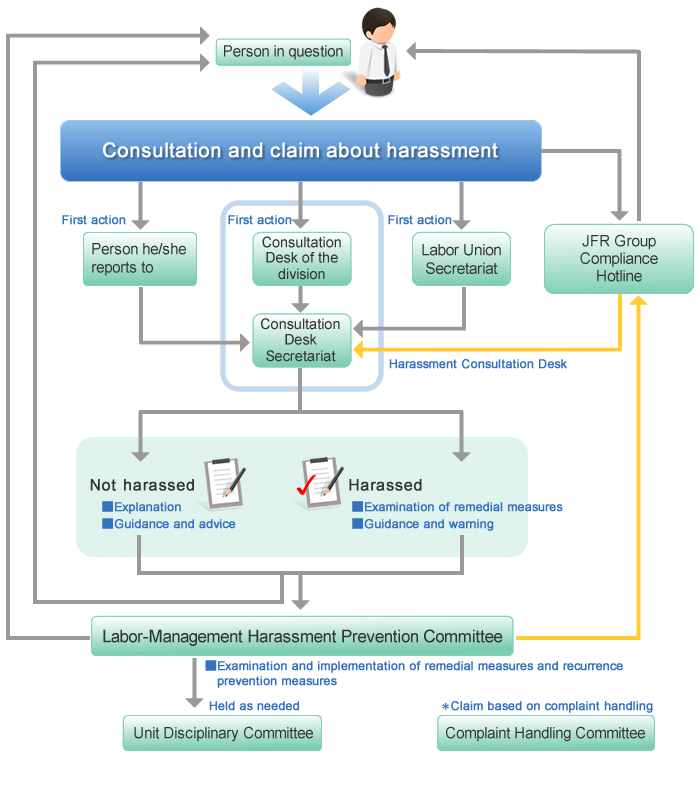
Human Rights Awareness Promotion Committee
We provide human rights education and strive to raise employees’ awareness of human rights from the perspective that individual employees should correctly recognize and understand human rights issues and that we should further promote the creation of corporate culture and corporate social responsibility based on respect for human rights.
Major initiative: Establishment of the “Human Rights Awareness Promotion Committee”
【Composition】
Chairpersons (Executive General Manager of Human Resources Development Division and Executive Store Managers
/ Store Managers), promotion commissioners (division managers), promotion staff (members) and
secretariat
【Activity themes】
(i) Dowa issues (Japan’s historical caste-based discrimination issues) ⇒ Correct understanding of dowa
issues
(ii) Disability issues ⇒ Correct recognition and understanding of disabilities
(iii) Women’s issues ⇒ Understanding and prevention of sexual harassment, etc.
(iv) Other human rights issues ⇒ Protection of the confidentiality of personal information and others
【Specific activities】
(i) Participation in training ⇒ Training when joining the company, in-house human rights seminars and
others
(ii) Participation in outside training ⇒ Various seminars organized by governments
(iii) Hands-on activities ⇒ Distribution of various educational materials and notices of seminars
Labor-Management Relations
In Japan, the Labor Standards Act and other labor relations-related laws set forth basic rules regarding labor rights including employment opportunities, working hours and health and safety and require both labor and management to comply with them.
At each operating company in the Group, issues concerning working conditions and the improvement of economic status are resolved autonomously by labor and management in line with the actual situation of the unit labor union. J. Front Retailing and the Federation of J. Front Retailing Group Labor Unions hold the “JFR Labor-Management Meetings” to deepen the mutual understanding of labor and management and help operating companies in the Group develop smooth labor-management relations.
*Overall membership rate in the Federation of J. Front Retailing Group Labor Unions: 74% (June ,2024)
Empowering diverse human resources to shine
-
Human resources Strategy
-
Promoting Women's Empowerment
-
Employment of Disabled People
-
Promotion of the Elderly Empowerment
-
Actions on LGBT Issues
-
Human Rights and Labor-Management Relations
-
Initiatives to Realize Work-Life Integration
-
Promoting Health and Productivity Management
-
Support to Help Employees Develop Their Careers
-
Social Data
-
Acquisition of Third-Party Assurance
